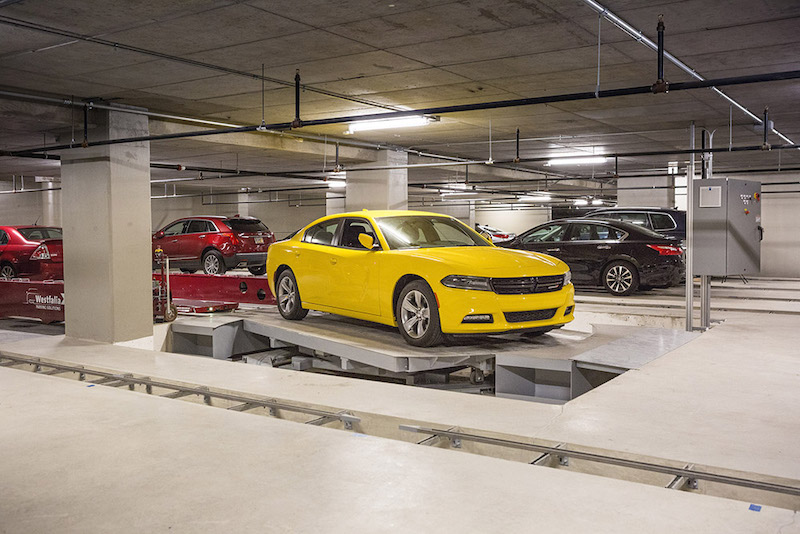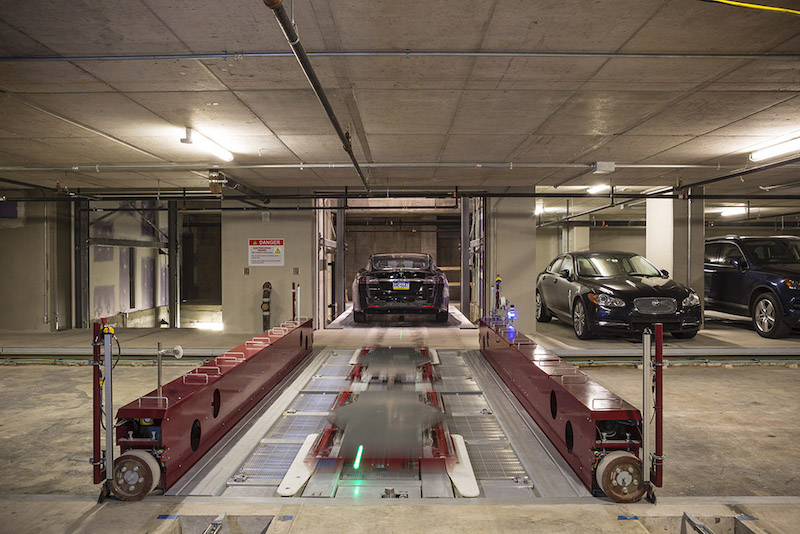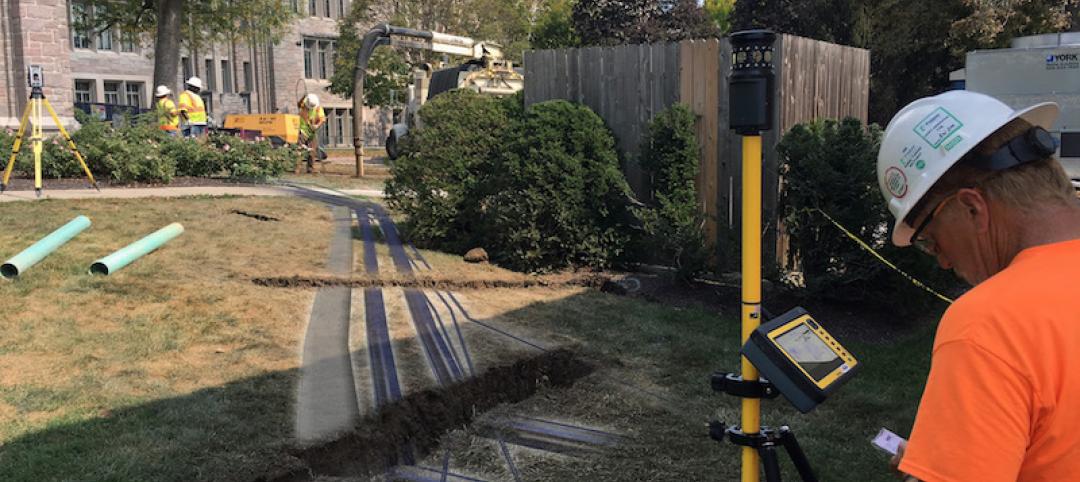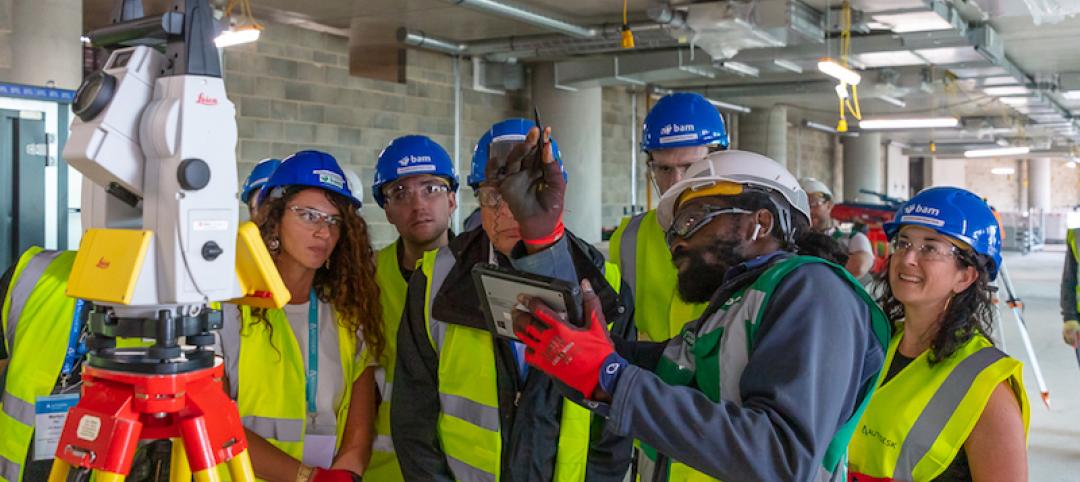500 Walnut is a 26-story luxury condo building with 35 residences whose selling prices average $5 million, the highest in Philadelphia to date, according to the building’s developer Scannapieco Development Corporation (SDC)
The tower—designed by Cecil Baker + Partners and built by Intech Construction—includes all of the high-end amenities one might expect, such as a heated pool, fitness center, dog grooming, massage room and sauna, and “outdoor retreat.” And then there’s something entirely different: an automated palletless parking system with 86 parking slots, far more than this building could have accommodated had it gone instead with a more conventional alternative.
“This amenity adds a level of convenience that no other building can,” says Tom Scannapieco, SDC’s owner.
How the automated parking system works
The system, installed by Westfalia Technologies of York, Pa., works like this: The resident drives into the building through a street-level bay door that he or she opens electronically via a transponder attached to the car’s grill or bumper. The driver enters a covered auto court—a kind of lobby, says Scannapieco—and then places the car into a transfer “cabin.” Drivers and passengers get out, and proceed to a kiosk into which the resident scans a key fob to answer a few safety questions on a touch screen—are the car doors shut, is the parking brake engaged, is the engine turned off, etc.—that the parking control system evaluates prior to storage.
A lift within the cabin lowers the car to the basement level, where the vehicle is then positioned onto a palletless transfer platform, which Westfalia’s Satellite (R) technology adjusts for the length of the car’s wheelbase. That platform rotates the vehicle 180 degrees so it can be easily driven out when retrieved, and then moves the car into the nearest parking slot.
When drivers need their vehicles, they can scan their fob either in the building’s elevator or at the kiosk, and the system automatically brings the car back to the transfer cabin. (The lobby kiosk notes the car’s position and expected retrieval time.)
500 Walnut has two transfer areas and two transfer platforms. Residents have 24/7 access to this system. There’s negligible risk of vehicle damage, theft, or break-in because there’s no reason for humans to be in the actual parking area.

The automated system rotates the car before it's parked, so that it can be easily driven out of the garage upon driver retrieval. Image: Courtesy of Westfalia Technologies
How much does all this cost? Scannapieco and Ian Todd, Westfalia’s director of Automated Parking Systems, didn’t answer that question directly. On a per-sf basis, 500 Walnut’s 50,840-sf garage with state-of-the-art technology and mechanicals cost double a conventional parking garage, Scannapieco estimates.
But he’s quick to note that on a per-car basis, “there’s no premium,” basing that assessment on the fact that a conventional parking ramp system, with fire protection and ventilation included, would have been impossible to pull off within a building this size, to say nothing of the number of parking slots that Westfalia’s solution provided.
“By having this technology, we’re doubling our parking yield,” says Scannapieco. Todd adds that the developer saved money on excavation, and increased the value of its residential units by enhancing the user’s experience. (Scannapieco says the parking garage has become the most popular amenity in the building.)
500 Walnut opened in early 2018. Westfalia is currently installing its second palletless parking system, with 160 parking slots, in another building about a mile from 500 Walnut. That building is scheduled to open next year. Westfalia also installs palleted systems, but Todd is convinced that the newer technology will catch on as more developers and prospective owners become aware of it.
He adds, parenthetically, that while an automated palletless parking system could be installed in an existing building, there are far greater efficiencies when that system is part of a building’s original design.
Related Stories
AEC Tech | Jul 29, 2019
2019 Bluebeam Extreme Conference: Peer-to-Peer Learning at Scale
XCON 2019 to focus on collaborative partnerships and what works in digital construction
Multifamily Housing | Jul 23, 2019
Is prefab in your future?
The most important benefit of offsite construction, when done right, is reliability.
AEC Tech | Jul 15, 2019
Lack of standards hampers development of exoskeleton industry
Guidelines, common terminology, and testing methodology are needed, says expert.
AEC Tech | Jul 15, 2019
Investors eye startups focused on automating construction
Investors could reap big payoffs in an industry that experts say is ready for automation.
AEC Tech | Jul 12, 2019
A new Dodge-Viewpoint report gauges how well contractors gather and use jobsite data
Information is power, but are contractors collecting what they need to make better decisions?
| Jul 11, 2019
Pepper Construction is using 3D models to help identify underground utilities on jobsites
Overlaying new installs and site surveys add precision to the construction process.
AEC Tech | Jul 10, 2019
Blue Collar Labs launches Builder’s Almanac, an online construction technology evaluation platform
The free online resource aims to eliminate subjective bias from the contech software evaluation process.
AEC Tech | Jul 2, 2019
Living in a cloud: What nanotech means for architecture and the built environment
Could there come a time when buildings will become less about bricks and mortar and feel more like mists or fogs?
AEC Tech | Jun 28, 2019
In London, Autodesk homes in on construction management
The software goliath sounds the alarm about the urgent need for productivity improvements to address unbridled urbanization.
Giants 400 | Jun 26, 2019
How are the AEC Giants faring in the tech arms race?
About half (42%) say their firm is “on par” with their most-direct AEC competitors.

















